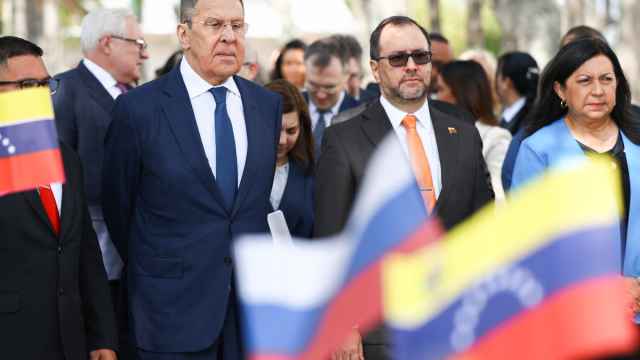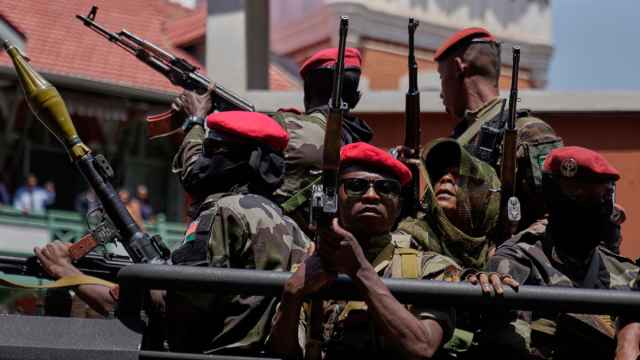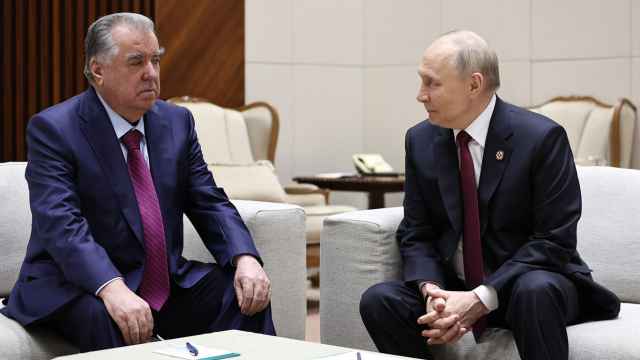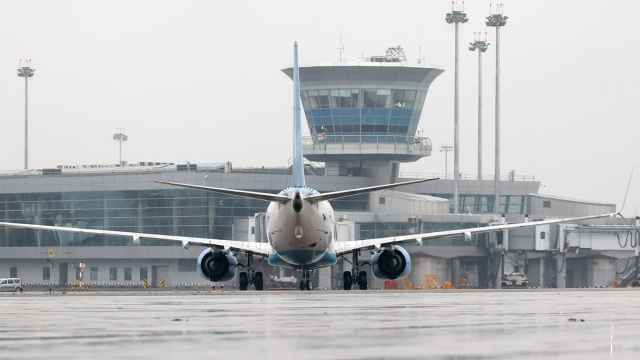Against the backdrop of a global equity sell-off and dropping oil prices, Russian markets panicked for a second consecutive day Friday plunging to a 2011 record low at speeds reminiscent of the 2008 crisis.
The benchmark MICEX closed down 4.48 percent Friday at 1327.19, adding momentum to a decline of 7.82 percent the previous day. The dollar-denominated RTS fell 5.18 percent, closing at 1315.95. Thursday had seen RTS dive 8.61 percent, its biggest drop since February 2009.
Moscow's bourses have retreated in the last week by 16 percent and 12 percent, respectively, leaving most stocks hovering around levels not seen since mid-2010.
"It's desperate selling," said Alexander Zakharov, head of international sales at Finam. "No one wants to catch the falling knife."
Analysts predicted that Prime Minister Vladimir Putin's announcement that he would stand for the presidency Saturday would have little immediate effect on current stock trends.
The equity tailspin in recent days has mirrored what occurred in early August as fears about political dithering in Washington, the U.S. credit rating downgrade by Standard and Poor's and a burgeoning sovereign debt crisis in Europe took hold.
"I do not expect any market reaction to the news [of Putin's candidacy] — investors are more concerned about global events and the weakening oil price," Troika Dialog's chief strategist Chris Weafer wrote in a note.
Thursday's dive on bourses around the world was precipitated by a warning from the Federal Reserve about the U.S. economy and pessimistic comments from the World Bank and the International Monetary Fund.
"Since the beginning of August, the talk of the town has been that we're heading for the next recession," Finam's Zakharov said.
Oil prices have headed downward in recent days alongside speculation that the much-anticipated double-dip recession for the global economy might be around the corner.
Urals crude — the benchmark for Russian oil — declined to $106.68 a barrel Friday, its lowest level since Aug. 19 and its seventh consecutive day fall. It has dropped a total of 9.3 percent over the course of last week.
The markets in Russia — which is reliant on the energy industry for 14 percent of its gross domestic product — have long been closely linked to the oil price.
"If we have a slowdown in either the U.S. or European economies, it will have a direct impact — oil prices coming down will be very, very bad for Russia," said James Cook, founder of the Aurora Russia investment fund.
Russia is traditionally hit hard in a sell-off because investors view it as more risky — oil dependence being one of the reasons — than other emerging markets. Russia has been the leading country for capital outflows for the third week running, according to a VTB Capital research note.
European and U.S. markets pared earlier losses late Friday, taking some comfort from a G20 statement that its policymakers were committed to a robust response to the economic turmoil. In London, the FTSE 100 closed up 0.5 percent.
Analysts said a Russian rebound was possible going into next week, but that it would be nothing more than a rebound and the general trend was downward.
The ruble extended its weeklong decline Friday, closing against the dollar at 32.05 and against the euro at 43.35. It dropped 9 kopeks against the euro-dollar basket, putting its weekly slide at 3.8 percent.
Aurora's Cook singled out the European financial situation as a primary cause. Countries such as Greece and Spain are grappling with potential default, and there were reports on Friday that the European Union was seeking to speed up the process of recapitalizing smaller banks.
"The situation in Europe is breeding more and more uncertainty in the market," he said. "Whenever investors have uncertainty it creates more and more volatility."
Investors are looking for reassurance from politicians, many of whom were gathered last week and over the weekend in the United States for meetings of the United Nations, IMF and World Bank.
Finance Minister Alexei Kudrin said late Friday in Washington that Russia was acutely aware of its vulnerability to global market shocks, and that the world was facing up to a decade of lost growth, Bloomberg reported.
Deputy Economic Development Minister Stanislav Voskresensky said Russia was more "mentally prepared" to deal with a global economic crisis than in 2008.
A Message from The Moscow Times:
Dear readers,
We are facing unprecedented challenges. Russia's Prosecutor General's Office has designated The Moscow Times as an "undesirable" organization, criminalizing our work and putting our staff at risk of prosecution. This follows our earlier unjust labeling as a "foreign agent."
These actions are direct attempts to silence independent journalism in Russia. The authorities claim our work "discredits the decisions of the Russian leadership." We see things differently: we strive to provide accurate, unbiased reporting on Russia.
We, the journalists of The Moscow Times, refuse to be silenced. But to continue our work, we need your help.
Your support, no matter how small, makes a world of difference. If you can, please support us monthly starting from just $2. It's quick to set up, and every contribution makes a significant impact.
By supporting The Moscow Times, you're defending open, independent journalism in the face of repression. Thank you for standing with us.
Remind me later.






